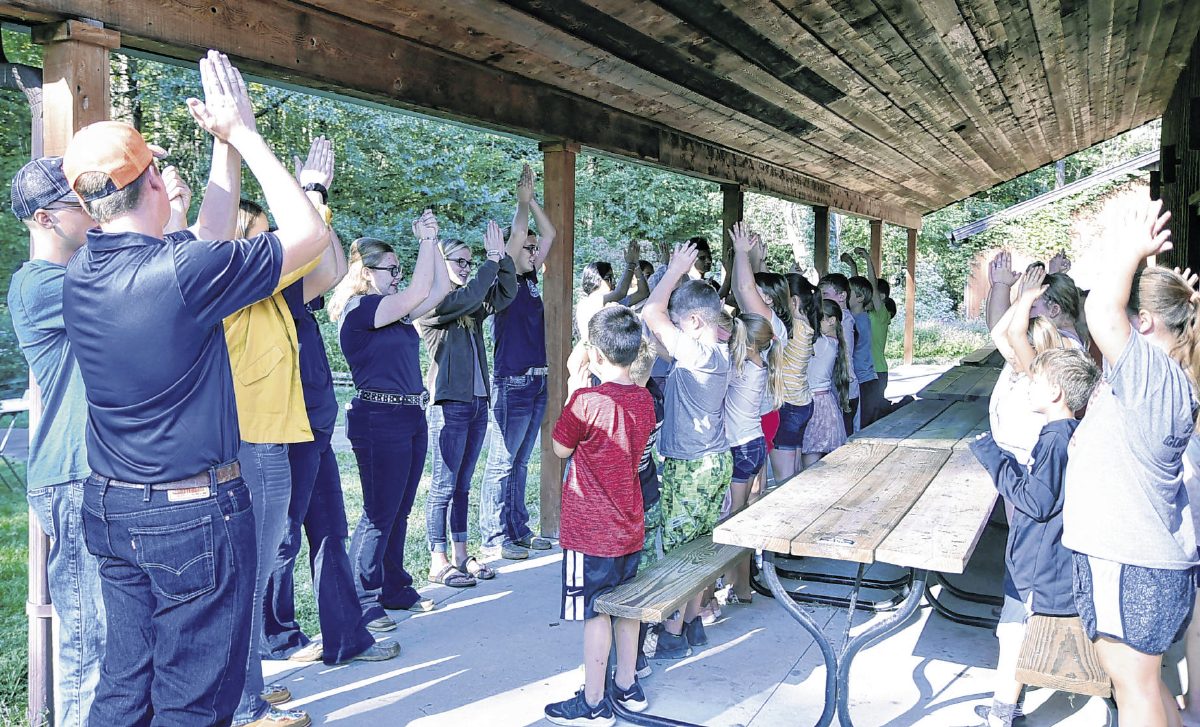
When Adam Newkirk and Ileana Brock were third-graders, their teachers loaded up buses to take them and their classmates to Muscatatuck National Wildlife Refuge early in the school year.
The objective of the field day was to teach schoolchildren from Jackson County about natural resources and recycling and to have fun while doing it.
While Newkirk is a sophomore and Brock is a senior at Seymour High School now, the Seymour FFA chapter members participated in that same trip two days this past week.
On Tuesday and Thursday, between 500 and 600 third-graders from all across Jackson County converged on the refuge, located off of U.S. 50 just east of Seymour, for Conservation Field Days.
[sc:text-divider text-divider-title=”Story continues below gallery” ]
Click here to purchase photos from this galleryFive stations were set up for the kids with each featuring different experts teaching about wetlands, water cycle, wildlife, trees and recycling.
The annual event is a partnership effort between many conservation agencies.
Among those that led the sessions were Richard Beckort, Purdue Extension educator of agriculture and natural resources; Terry Ault, district coordinator for the Jackson County Soil and Water Conservation District; Donna Stanley, a park ranger at the refuge; Sandy Derringer, a park ranger at Big Oaks National Wildlife Refuge near Madison; Debbie Hackman, director of the Jackson County Recycling District; and Bernie Bryant, an environmental educator with the Seymour Department of Public Works.
Members of Seymour’s FFA chapter and students from life science classes at the high school assisted the instructors.
Ault said this year’s event at the refuge was the 25th straight.
“The kids love it,” she said. “Natural resources, people need to understand how important they are and how it’s our responsibility to take care of their Earth. Hopefully, teaching them about the importance of natural resources will carry on into their adult life.”
The stations featured different activities for the children. At one station, they could make a bracelet while learning the different stages of the water cycle. As the kids learned about the cycle, they added beads to their bracelets, which they later took home.
“Children usually retain what they learn if they’re active,” Ault said. “All of these sessions have a hands-on activity that they get to do. With the water cycle, they take home a bracelet. They play games with some of the other sessions that go on. We hope that we make it fun and it sticks.”
Ault said not much has changed with the field day over the years, but this year was the first time there were students who helped translate some of the lessons to Spanish.
Both Newkirk and Brock said they had fun returning to the refuge to help the kids.
“I think it’s good to teach kids about the environment. They need to know more about their outside world,” Newkirk said. “It’s a completely different experience coming out here and helping them. It’s good to see kids out here learning the same things I did in the third grade.”
Brock agreed.
“We come out here almost every year and come out and help the community,” she said. “We’re helping teach the kids about the water cycle. It’s really important for them to learn these things. They really like to come out and play games while learning. I think it really sticks better when you come out here and play games.”
In the morning session Thursday, third-graders from Brownstown Elementary and Cortland Elementary schools visited the refuge.
“We’ve been discovering the wildlife,” Cortland’s Paige Runge said. “It’s a pretty great place. I think Muscatatuck is pretty awesome.”
Kenneth Harris, who is in Jo Ferguson’s class along with Runge, said he learned a few different things during the field day.
“I didn’t know that water evaporates to clouds,” Harris said. “I knew a few different things that you can and can’t recycle, but I didn’t know that you can’t recycle things like pizza boxes with grease and stuff like that.”
Lynnley Daraswad, who is in Beth Shelton’s class at Brownstown, said she had a great time on the trip.
“I’ve been learning about animals, water and recycling,” she said. “I like learning about the water and getting beads. I think it’s fun. It’s fun to learn about these kinds of things.”
Brownstown student Brayden Haub, whose teacher is Kourtney Settle, liked the hands-on activities.
“We learned about the water cycle. My favorite part was learning and making the bracelet,” he said. “I also learned about different extinct animals.”
